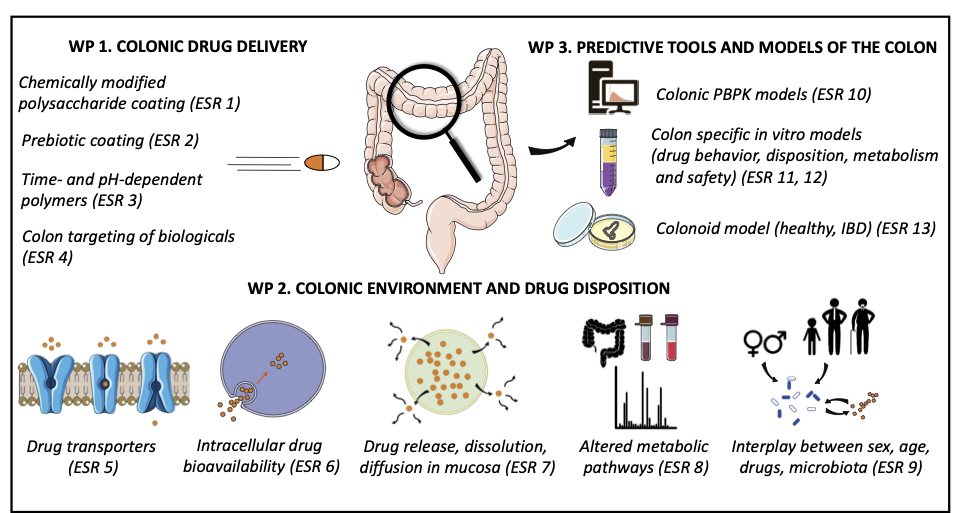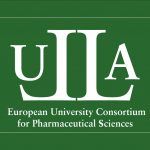COLOTAN deals with a topic of growing medical and societal concern: obtaining a sufficiently high drug concentration in the colon (large intestine) to efficiently treat diseases of the large intestine. Oral administration of drugs is the most common delivery route due to its non-invasive character and convenience for the patient. However, issues related to pharmacokinetics (PK) and bioavailability remain a prominent cause of oral drug candidate attrition. Therefore, the European Medicines Agency (EMA) and the US Food and Drug Administration (FDA) call for research into new predictive (virtual) tools, innovative drug delivery systems and precision medicine approaches.
Oral formulations that release the drug in a pH- or time-dependent manner in the colon are commercially available. They are used to obtain topical treatment of colonic diseases such as inflammatory bowel diseases (IBD), that have become a global disease with high incidence in Europe, Oceania and the USA, but also for controlled release of a drug for systemic treatment (e.g. controlled release carvedilol). However, these formulations suffer from an inconsistent and inefficient performance, due to incomplete understanding of processes occurring in the colon. Moreover, the currently available evaluation tools to predict drug performance focus mainly on the upper GI tract, resulting in a lack of validated tools and models of the colon with high physiological relevance and predictive capability.
COLOTAN’s objective
The main scientific objective of this project is to improve colon targeting of drugs in order to efficiently treat diseases of the large intestine. To reach this goal, the sub-objectives have been defined: (1) developing innovative colon-targeting formulations, (2) acquiring a thorough understanding of drug and formulation behaviour in the colon and (3) improving predictive tools and models of the colon, a major bottleneck in drug development.
Research methodology and approach
The three sub-objectives form the basis of the three scientific work packages (WPs) in this project. WP1: the colonic drug delivery systems, WP 2: the colonic environment and WP3: drug disposition and predictive tools and models of the colon. Each of the COLOTAN 13 Early Stage Researchers (ESRs) works on an individual project within their work package. In WP 1, researchers develop novel formulations for delivery of drugs to the colon with superior efficiency and specificity compared to the currently available formulations. In addition, they optimize formulation production processes and develop tests to evaluate their physicochemical properties. This will be done for both small molecules and for large molecules like peptides and proteins. In WP 2, researchers study the colonic environment and the behaviour of drugs and formulations in it. They identify key metabolic processes, study the role of drug transporters, sex, age and gut microbiota on drugs. In WP 3, researchers expand the physiological relevance and predictive capacity of in silico and in vitro tools and models to assess drug and formulation behaviour in the colon.
The project follows a multidisciplinary approach including disciplines like (physical, analytical and organic) chemistry, drug delivery, drug disposition, cell biology, gastroenterology, microbiology and modelling and simulation.

Overview of the Individual Projects in COLOTAN
COLOTAN aim
COLOTAN aims to induce innovations in the highly promising area of colon specific drug delivery, and ensure its proper implementation. The availability of highly trained professionals in various disciplines and who are experts in the latest technology advancements is imperative.
The COLOTAN project was an initiative of the ULLA partners. ULLA is a European university consortium for pharmaceutical sciences, aiming to enhance collaboration within education and research in pharmaceutical sciences.
The overarching goal of the colon targeting network (COLOTAN) is to provide high-level training to 13 early stage researchers (ESRs) in drug delivery, drug disposition and gastrointestinal (GI) (patho)physiology to improve targeting of drugs to the colon and to provide them with the transferable and scientific skills necessary for a successful career. This international training program, combining 10 countries, focuses on innovative technological and scientific developments across a range of interdisciplinary fields such as (physical, analytical and organic) chemistry, drug delivery, drug disposition, cell biology, gastroenterology, microbiology and modelling and simulation. The aim of this project will be achieved by a unique combination of intersectoral research training facilitated by 10 beneficiaries (7 academic and 3 non-academic) and 6 partner organisations. The COLOTAN consortium consists of leading research groups from universities and from innovative pharmaceutical companies.



